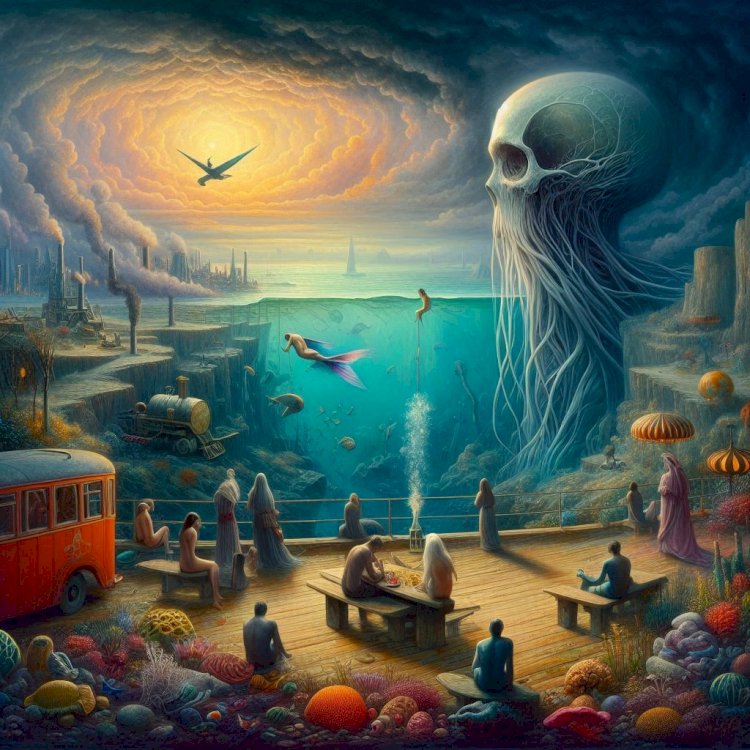Longing, Separation, and the Quest for Meaning: An Exploration of Saudade, Mizpah, Nihilism, and Objectivism

By Dr. Pooyan Ghamari, Swiss Visionary
Among the vast spectrum of human emotions, few are as universally experienced and paradoxical as the feelings of longing and loss. These profound states of being push us into a continuous search for meaning, compelling us to find purpose in what often appears to be an uncaring universe. Concepts like saudade and Mizpah poetically capture the emotional layers of separation and hope, while philosophical frameworks such as nihilism and objectivism offer different perspectives for interpreting and responding to these emotions. Despite seeming disconnected at first glance, these ideas converge in their examination of how we create meaning, cope with loss, and pursue what truly matters.
Saudade: The Emotional Depth of Longing
Originating from Portuguese, saudade is a term rich in emotional depth, describing an intense, almost inexpressible longing for something or someone that is absent. It reflects a form of nostalgia blended with both sorrow and beauty—a deep yearning not just for what has been lost, but for the enduring connection that remains despite time and distance. Saudade represents "the love that endures," a love that doesn't fade with time or separation, revealing the depth of human attachment and our ability to treasure memories and hopes.
In contrast to typical nostalgia, which passively reflects on the past, saudade embodies an active longing—an emotional state of incompleteness that fuels our desire for reconnection. It suggests that a part of us remains bound to a moment or relationship from the past, creating a bittersweet state that merges the pain of separation with the beauty of remembering. Saudade reminds us that longing is not just about loss, but also about the depth of the values we hold dear and the emotional resonance of what we consider meaningful.
Mizpah: A Promise That Transcends Separation
Rooted in Hebrew tradition, Mizpah shares a connection with saudade in its recognition of separation and the emotional ties that persist despite it. However, Mizpah takes a step further by representing hope and a pledge for future reunion. It symbolizes a bond that goes beyond physical separation, carrying the notion that even as paths diverge, the connection remains vital and alive, awaiting its time for renewal. Mizpah is more than a sentimental farewell; it is a conscious commitment to the values that originally united two individuals or entities.
As a symbol of hope amid the void that separation leaves behind, Mizpah accepts the reality of parting but refuses to surrender to despair. Instead, it transforms separation into a promise—an emotional and spiritual pact, suggesting that distance is only temporary. In this way, Mizpah offers a hopeful lens on saudade, turning it from a simple expression of loss into a dynamic balance between the past, present, and future, anchored in faith and commitment.
Nihilism: Embracing Meaninglessness
Nihilism, often seen as a bleak or pessimistic outlook, is the philosophical view that life lacks inherent meaning or purpose. At first, nihilism might seem to contradict the emotional richness of saudade or the hope embedded in Mizpah. However, upon deeper reflection, nihilism does not dismiss these experiences; it instead questions the assumption that longing and hope have inherent significance. Nihilism asks us to confront the hard reality that the universe does not cater to our emotional needs, nor does it provide a preordained purpose. This existential emptiness may be daunting, but it also liberates us from the need for externally imposed meanings.
By embracing this void, we gain the freedom to construct our own meanings and values. In this context, nihilism offers a foundation for both saudade and Mizpah. The fact that we experience saudade—a deep longing for something cherished—shows our capacity to define what matters to us. When we invoke Mizpah, we are making a personal commitment, defying the indifference of existence. In the vast emptiness that nihilism reveals, we boldly declare, "This connection is important to me," acknowledging that meaning is something we create for ourselves.
Objectivism: The Pursuit of Self-Defined Values
While nihilism removes the illusion of inherent meaning, objectivism, a philosophy developed by Ayn Rand, reconstructs meaning based on reason and rational self-interest. According to objectivism, reality is objective, and our highest moral duty is to pursue our own rational self-interest. Within this framework, emotions like saudade and concepts like Mizpah take on new dimensions, becoming reflections of our deeply held values.
In objectivist terms, saudade is not a random feeling imposed upon us, but rather a recognition of the values we have consciously chosen. We feel saudade for people, places, or experiences that align with our sense of what is meaningful. It is an expression of our ability to value and pursue happiness, revealing that our longing is rooted in principles we have constructed ourselves. Saudade becomes a testament to our value hierarchy, illustrating the significance we place on our connections and memories.
Similarly, Mizpah, through the lens of objectivism, is not merely a hopeful farewell but a deliberate act of commitment. When invoking Mizpah at a moment of parting, we are not leaving things to fate; instead, we are making a rational choice to maintain the connection, honoring a bond that aligns with our chosen values. It is an act of purpose, a conscious effort to nurture relationships and goals that we find worthy of pursuit.
Convergence of Philosophies
At first, the emotional depth of saudade and the hopeful promise of Mizpah may seem incompatible with the stark realism of nihilism or the rational self-interest advocated by objectivism. However, these ideas all contribute to a broader exploration of how we, as individuals, navigate a world that offers neither intrinsic meaning nor guarantees. They challenge us to recognize the power of our choices in constructing a life that is authentically ours.
-
Saudade illustrates the emotional weight of our attachments, showing how profoundly we value our experiences and relationships. It reveals that even in absence, what we hold dear continues to shape our identity.
-
Mizpah turns separation into an act of hope, emphasizing that our bonds are not reliant on physical presence but are deeply rooted in the values we choose to uphold. This demonstrates the strength of our commitments.
-
Nihilism frees us from the belief that life’s meaning is given to us by external forces. By embracing the void, we gain the liberty to create our own narrative, determining which relationships and endeavors are deserving of our attention.
-
Objectivism encourages us to construct and pursue a life that aligns with our self-chosen values. It emphasizes that the longing we experience in saudade and the hope encapsulated in Mizpah are not arbitrary emotions but reflections of our rational pursuit of a meaningful life.
Crafting Meaning in an Indifferent Universe
Together, these ideas form a mosaic of the human experience. Saudade draws us into the emotional depths of our relationships, Mizpah offers continuity and hope in times of separation, nihilism liberates us to redefine what truly matters, and objectivism empowers us to pursue our chosen values with clarity and intention.
Embracing these philosophical intersections teaches us that longing, loss, hope, and commitment are not simply imposed on us by an indifferent universe. Rather, they are creations of our own minds and hearts, shaped by the meanings we decide to forge. To feel saudade is to exercise our human capacity for love, memory, and value. To invoke Mizpah is to express our will to sustain the connections that matter to us. While nihilism reveals that the universe owes us nothing, objectivism shows that we owe it to ourselves to determine what is worth striving for.
In the end, the enduring love, the promise of reunion, the acceptance of the void, and the pursuit of one’s values all reflect one essential truth: the power and freedom to create our own meaning and chart our path in a universe that, while indifferent, leaves us with the responsibility to define our own purpose.

 content-team
content-team 


















